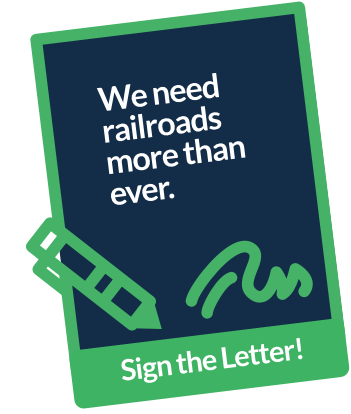 The U.S. Surface Transportation Board (STB), which oversees the economic regulation of freight railroads, is considering a rule that would mandate reciprocal switching among freight railroads. They will hold a hearing in March to examine this policy of forced access.
The U.S. Surface Transportation Board (STB), which oversees the economic regulation of freight railroads, is considering a rule that would mandate reciprocal switching among freight railroads. They will hold a hearing in March to examine this policy of forced access.
Why It Matters
Forced access would compromise the efficiency of the rail network and undermine service for rail customers and communities coast-to-coast when the supply chain is already facing severe challenges. Slowing train operations across a 140,000-mile network moving 1.5 million railcars at any given time would hurt the factories, farms, ports and local economies that rely on speedy and consistent rail service.
Over time, the rule would make railroads less competitive with other modes, lead to network disinvestment and shift freight from railways to publicly funded highways. Less freight rail means more local highway congestion and more greenhouse gases, as railroads today move 40% of intercity freight but account for just 1.9% of transportation-related emissions.
Want more background? Read our Issue Brief.

Sign the Letter
Please consider joining our grassroots letter to the STB, urging them to reject the proposed rule on forced access. Before the Board's March hearing, we want to ensure they've heard from a variety of the voices who benefit from robust railroads and who would be negatively impacted by diminished rail service.
To sign, fill out the fields below and click "Sign the Letter" to add your name.
[Download not found]
Dear Chairman Oberman and Members of the Surface Transportation Board,
Freight demand is expected to grow 30% over the next two decades. We are concerned that the proposed rule on reciprocal switching (EP 711-1), if implemented, would lead to less rail usage in the future — an outcome that would negatively impact communities, businesses and local economies across the country, undermine intercity passenger rail, and increase transportation-related emissions.
U.S. freight railroads account for 40% of long-distance freight in the United States (but just 1.9% of transportation-related emissions) and host nearly three-quarters of Amtrak’s passenger network. They also self-fund the maintenance of their networks and operations, a huge economic benefit to the communities and businesses connected to the world’s most productive and cost-effective freight rail system.
Continued investments are critical to safety and efficiency on this network. Because EP 711-1 stands to undercut rail revenues, it also stands to undercut the massive investments that enable efficient service. Less efficient service disadvantages rail customers and pushes them to other modes.
For our communities and businesses, forced access presents both short-term disruption to an already strained supply chain and long-term harm if it leads to fewer transportation options for businesses and more congestion on public infrastructure — not to mention diminished passenger rail service.
Another consideration is the potential impact of the rule on the carbon footprint of U.S. goods movement. Researchers at the think tank Third Way have urged Congress to enact policies that shift freight “away from more carbon-intensive modes like trucking and aircraft and towards rail.” Just a 10% shift would cut greenhouse gas emissions by 17 million tons annually. It makes little sense, in this context, to pass a rule that could result in just the opposite.
Freight transportation is changing as e-commerce reshapes supply chains. Railroads face steep competition, not only from each other, but also from other modes like trucks. Forced access would not only disrupt the most reliable piece of the supply chain, but also jeopardize the long-term viability of railroads across the nation.
Especially in this moment, when our supply chain, economic recovery and environmental future are top of mind, rail is a tool that could address multiple national goals. For these reasons, we urge the Board to oppose the proposed rule on reciprocal switching (EP 711-1).
Sincerely,


